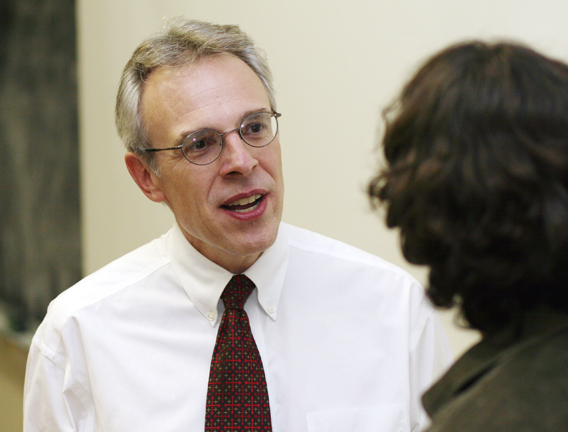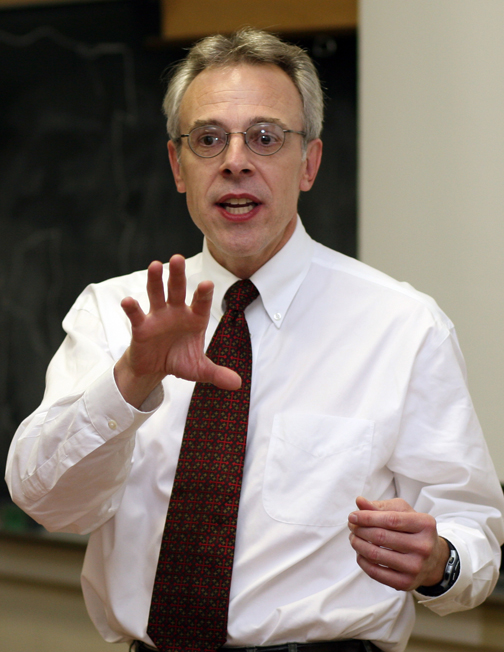 During his talk Thursday night about the Democratic Republic of the Congo, Rev. John Van Nuys ’84 showed in rapid succession almost 100 slides of the friends he met during his two trips to the African nation in the 1990s.
During his talk Thursday night about the Democratic Republic of the Congo, Rev. John Van Nuys ’84 showed in rapid succession almost 100 slides of the friends he met during his two trips to the African nation in the 1990s.
But the image that lingers—overshadowing all the photos of men and women working together and children smiling, even laughing at the camera—is the photograph of a cross-shaped landing strip slashed out of the deep green rainforest in the Kasai region. That cruciform runway seared into Van Nuys’ memory and conscience a metaphor for "a blessed and good people cursed with a terrible history."
Van Nuys' audience in Center Hall included freshmen from English professor Agata Brewer’s "A Tour of Power and Knowledge" tutorial, who are getting a taste of that bitter history as they read Joseph Conrad’s Heart of Darkness. Conrad’s masterpiece was published in 1902—near the final years of Belgian King Leopold’s exploitation of the Congo, during which he used his mercenary army to force slaves into mines and rubber plantations, burn villages, mete out sadistic punishments, and take the lives of 6,000,000 people.
Telling the story of a sailor named Marlow and his journey up the Congo River, Conrad —who spent eight years captaining a Congo River steamer during Leopold’s rule—reveals the brutality and horror at the core of colonialism.
Van Nuys' memories of his own trips to the Congo illuminated the legacy of that exploitation—a people trying to rise up not only from Leopold’s cruelty, but from the tragic 30-year governance of Mobutu Sese Seko, followed by recent warfare spilling over from neighboring Rwanda and Uganda. Van Nuys was in the country when civil war broke out in 1996; the pastor and his colleagues were evacuated from the country by U.S. Marines.
In spite of this history, one of the highest mortality rates in the world, a health care situation described by international aid agencies as catastrophic, and an infrastructure Van Nuys called "surreal," the pastor said the people of the Congo are "the hardest working people I've ever met.
"Given half a chance, they’ll knock the ball out of the park," Van Nuys said. "It takes such extraordinary effort and ingenuity just to survive, just to feed their children. Our Hoosier pioneer forebears would recognize and admire the determination of these people."
The minister added that one Congolese friend’s response to his question, "What is the biggest health care problem in the Congo?" was, simply: "Our women wear out too soon."
 When a Wabash student asked what the nation needed most, Van Nuys replied, "A really muscular United Nations peacekeeping force." During his own visits, the pastor had a much more modest offering. Sent to the country to partner with the Congolese Presbyterian church there, Van Nuys helped purchase hand-cranked sewing machines for women to make clothing for their families and for sale.
When a Wabash student asked what the nation needed most, Van Nuys replied, "A really muscular United Nations peacekeeping force." During his own visits, the pastor had a much more modest offering. Sent to the country to partner with the Congolese Presbyterian church there, Van Nuys helped purchase hand-cranked sewing machines for women to make clothing for their families and for sale.
"We were not in the country to convert people; the Church has been in the Congo for five generations—they were singing all the hymns I grew up with," Van Nuys said. "We were there to sit around the table with our brothers and sisters in the faith, to learn from them, and also to see how we might empower them."
Still corresponding with many of the people he met during his visits, Van Nuys says he tries "not to pay a lot of attention to bad news coming out of the country today." (Today’s headlines include a possible epidemic of deadly pneumonic plague in East Congo.)
"It can be overwhelming, make you lose heart," Van Nuys said. "I ask them how the family is doing, what they need."
Through one such correspondence he learned of a village in Katanga province where 60 young children had walked in by themselves—all of their parents had died of AIDS. "Every 14 seconds, an African child is orphaned by losing both parents to AIDS," Van Nuys said.
In the midst of such suffering, though, Van Nuys found hope, prompting one student to compare the minister’s journey to that taken by Marlow in Conrad’s Heart of Darkness.
"Conrad and Marlow found horror and despair in the same place you seem to have gained some enlightenment," the student noted.
"Maybe that’s because I got to know the people and to learn from them," Van Nuys said. "You have to be very humble when you approach a different culture. These people changed the way I live out my faith."